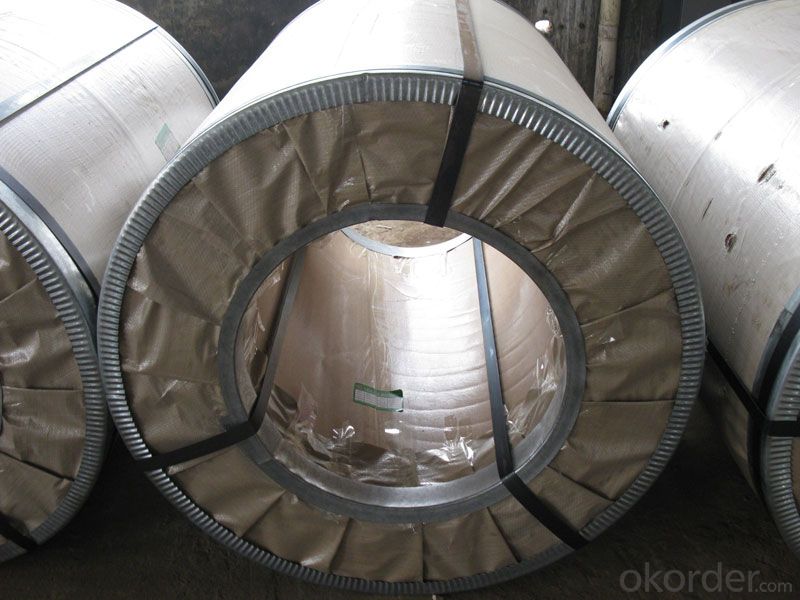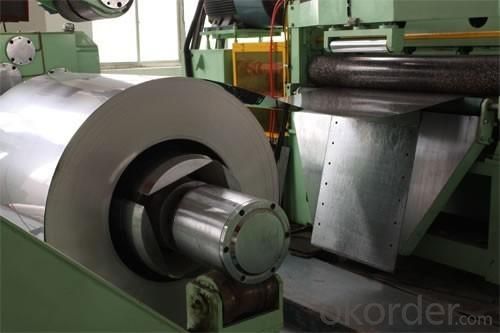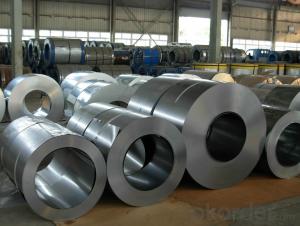Cold Rolled Steel Coil Q195~Q345 China Best Quality
- Loading Port:
- China main port
- Payment Terms:
- TT OR LC
- Min Order Qty:
- 50 m.t.
- Supply Capability:
- 10000 m.t./month
OKorder Service Pledge
OKorder Financial Service
You Might Also Like
Cold Rolled Steel Coil Q195~Q345 China Best Quality
1.Structure of Cold Rolled Steel Coil Q195~Q345 China Best Quality:
The raw material of cold rolled steel coil/sheet is high quality hot rolled product, and after pickling continuous rolling, degreasing, annealing,skin pass,slitting and cut to length line etc. Along with it many kinds of new technology and new process of global cold rolling production have been applied. Therefore the quality of the goods could be guaranteed.
2.Main Features of Cold Rolled Steel Coil Q195~Q34
• Excellent process capability
• Smooth and flat surface
• Excellent heat resistance performance
3. Cold Rolled Steel Images:


4.Cold Rolled Steel Specification
Standard:AISI,ASTM,DIN,GB,JIS,JIS G3302 ASTM 653M EN10142
Grade: Q195~Q345
Thickness: 0.16mm~2.0mm
Width: 1250mm MAX
Coil weight:3-12 MT
Coil ID:508/610mm
FAQ
1.How to guarantee the quality of the products?
We have established the international advanced quality management system,every link from raw material to final product we have strict quality test
2. How long can we receive the product after purchase?
Usually within thirty working days after receiving buyer’s advance payment or LC. We will arrange the factory manufacturing as soon as possible. The cargo readiness usually takes 15-25 days, but the shipment will depend on the vessel situation.
- Q:What are the different types of steel coil packaging methods?
- There are several types of steel coil packaging methods, including strapping, wrapping, and stacking. Strapping involves using metal or plastic bands to secure the coil and prevent it from unwinding. Wrapping is done by covering the coil with a protective layer, such as plastic or paper, to shield it from moisture and damage. Stacking involves placing multiple coils on top of each other, usually on pallets, to optimize storage space and facilitate transportation.
- Q:What are the common coil tests performed for quality control?
- The common coil tests performed for quality control include dimensional checks, visual inspections, mechanical property testing, surface defect examinations, and chemical composition analysis. These tests ensure that the coils meet the required specifications and standards, ensuring their quality and suitability for various applications.
- Q:What is the weight range of steel coils?
- The weight range of steel coils varies depending on the specific type and dimensions, but they generally range from a few hundred kilograms to several tonnes.
- Q:What are the common standards and specifications for steel coils?
- There are several common standards and specifications for steel coils that are widely recognized and used in the industry. Some of the most common ones include: 1. ASTM A36/A36M: This specification covers carbon structural steel shapes, plates, and bars of structural quality for use in riveted, bolted, or welded construction. 2. ASTM A572/A572M: This specification covers high-strength low-alloy columbium-vanadium structural steel shapes, plates, sheet piling, and bars for applications in bolted, riveted, or welded construction. 3. ASTM A653/A653M: This specification covers steel sheet, zinc-coated (galvanized) or zinc-iron alloy-coated (galvannealed) by the hot-dip process. 4. ASTM A1011/A1011M: This specification covers hot-rolled, carbon, structural, high-strength low-alloy, high-strength low-alloy with improved formability, and ultra-high strength steel sheet and strip in coils. 5. JIS G3302: This Japanese Industrial Standard specifies the requirements for hot-dip zinc-coated steel sheet (galvanized steel sheet) and strip. 6. EN 10111: This European standard specifies the requirements for continuously hot-rolled low carbon steel sheet and strip for cold forming. 7. ISO 3575: This International Organization for Standardization standard specifies the requirements for hot-dip zinc-coated and zinc-iron alloy-coated steel sheet and strip. These are just a few examples of the common standards and specifications used for steel coils. It is important to note that different industries and applications may have specific requirements, so it is always advisable to consult the relevant standards and specifications for the specific application.
- Q:What are the advantages of using steel coils in various industries?
- There are several advantages of using steel coils in various industries. Firstly, steel coils offer exceptional strength and durability, making them suitable for heavy-duty applications. They can withstand extreme temperatures, pressure, and mechanical stress, ensuring reliable performance and longevity. Additionally, steel coils are highly resistant to corrosion, which is crucial in industries exposed to harsh environments or corrosive substances. Moreover, steel coils can be easily formed and shaped into different sizes and configurations, providing flexibility for various manufacturing processes. Lastly, steel is a sustainable material as it is recyclable, contributing to a greener and more environmentally friendly approach in industries.
- Q:How are steel coils used in the production of automotive stampings?
- Steel coils are used in the production of automotive stampings as they provide a continuous and uniform supply of raw material. These coils are fed into stamping machines where they are cut, shaped, and formed into various automotive components such as body panels, chassis parts, and structural reinforcements. The use of steel coils ensures efficient and consistent production, resulting in high-quality automotive stampings that meet industry standards for strength, durability, and precision.
- Q:How do steel coil manufacturers ensure fair pricing?
- Steel coil manufacturers ensure fair pricing through various measures. Firstly, they conduct thorough market research to understand the current industry trends, demand-supply dynamics, and competitor pricing. This helps them determine a competitive yet fair pricing strategy that aligns with market standards. Secondly, steel coil manufacturers consider the cost of raw materials, production, and operational expenses to determine a reasonable base price. They also factor in economies of scale, as larger production volumes can lead to lower costs per unit. Additionally, steel coil manufacturers often establish long-term partnerships with suppliers to ensure a stable and consistent supply of raw materials at fair prices. This allows them to maintain a reasonable cost structure and minimize price fluctuations. Furthermore, these manufacturers strive for transparency in pricing by providing detailed quotations that break down the cost components. This helps customers understand the factors contributing to the final price and ensures fairness in the pricing process. To enhance fairness, steel coil manufacturers also consider the specific requirements of their customers. They may offer customized pricing based on factors such as order volume, delivery timelines, and value-added services. This approach ensures that each customer receives a price that is commensurate with their unique needs and requirements. Overall, steel coil manufacturers ensure fair pricing by conducting market research, considering cost factors, maintaining transparent pricing practices, and offering customized pricing options. By doing so, they aim to create a fair and mutually beneficial pricing environment for both themselves and their customers.
- Q:I want to buy a machete made of 1055 carbon steel, and want to know if this steel is durable for repeated use, or even combat use.
- 1055 Steel
- Q:How are steel coils used in the manufacturing of automotive body panels?
- Steel coils are used in the manufacturing of automotive body panels by being processed and shaped into the desired form through techniques like stamping or roll forming. These coils provide the raw material for creating strong and durable body panels, ensuring the vehicle's structural integrity and safety.
- Q:How are steel coils inspected for impact resistance using impact testers?
- To assess the impact resistance of steel coils, specialized machines called impact testers are utilized. These machines are designed to evaluate the coils' ability to endure impacts. The process involves subjecting the coils to controlled impacts and measuring the resulting deformation or damage. Initially, the steel coils are securely positioned and oriented on the impact tester. This ensures accuracy and consistency. The tester is equipped with a striking element, like a pendulum or falling weight, which applies a specific force upon impact. The element is aligned precisely with the steel coil for precise testing. Once the setup is complete, the impact tester is activated, and the striking element is released to impact the steel coil. The force of the impact is carefully controlled and measured to ensure consistency across multiple tests. The tester records various parameters, including applied force and impact duration. After the impact, the steel coil undergoes a thorough examination for visible deformation or damage. This includes checking for dents, cracks, or any signs of structural compromise. The extent of the deformation or damage is recorded and compared to predetermined acceptance criteria to determine if the coil passes or fails the impact resistance test. To gather additional data during testing, impact testers can be equipped with various sensors and cameras. High-speed cameras capture the impact in slow motion, allowing for detailed analysis of the coil's behavior. Strain gauges can also be attached to the steel coil to measure strain and stress experienced during the impact. In conclusion, the use of impact testers offers a reliable and standardized method for inspecting the impact resistance of steel coils. By subjecting the coils to controlled impacts and accurately measuring deformation or damage, manufacturers can ensure that their steel coils meet the required impact resistance standards for different applications.
1. Manufacturer Overview |
|
|---|---|
| Location | |
| Year Established | |
| Annual Output Value | |
| Main Markets | |
| Company Certifications | |
2. Manufacturer Certificates |
|
|---|---|
| a) Certification Name | |
| Range | |
| Reference | |
| Validity Period | |
3. Manufacturer Capability |
|
|---|---|
| a)Trade Capacity | |
| Nearest Port | |
| Export Percentage | |
| No.of Employees in Trade Department | |
| Language Spoken: | |
| b)Factory Information | |
| Factory Size: | |
| No. of Production Lines | |
| Contract Manufacturing | |
| Product Price Range | |
Send your message to us
Cold Rolled Steel Coil Q195~Q345 China Best Quality
- Loading Port:
- China main port
- Payment Terms:
- TT OR LC
- Min Order Qty:
- 50 m.t.
- Supply Capability:
- 10000 m.t./month
OKorder Service Pledge
OKorder Financial Service
Similar products
New products
Hot products
Related keywords






























